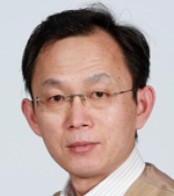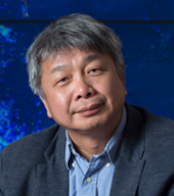 Fi-John Chang, PhD, National Taiwan University, Taiwan
Fi-John Chang, PhD, National Taiwan University, Taiwan
Fi-John Chang, a distinguished professor in the Department of Bioenvironmental Systems Engineering at National Taiwan University (NTU), is renowned for his groundbreaking contributions to environmental engineering. Graduating from NTU in Agricultural Engineering in 1984, he completed his PhD in Civil Engineering at Purdue University in 1988. He also serves as the Founding President of Taiwan Hydro-Informatics Society. His expertise spans transdisciplinary domains, encompassing integrated water resources management, environmental engineering and sciences, and water-energy-food nexus systems. Proficient in technological advancements, particularly in the realms of artificial intelligence (AI) and big-data analytics, he has substantially enhanced hydro-informatics technology, strengthened smart water resources management practices, and given rise to practical applications. Chang's influential work has significantly propelled our understanding and sustainable management of hydrological and environmental systems.
 Edwin E. Herricks, PhD, University of Illinois Urbana-Champaign, USA
Edwin E. Herricks, PhD, University of Illinois Urbana-Champaign, USA
Edwin E. Herricks holds a BA in Zoology and English from the University of Kansas (1968), a M.S. in Sanitary/Environmental Engineering from the Johns Hopkins University (1970) and a Ph.D. in Biology from the Virginia Polytechnic Institute and State University (1973). He is recognized for the use of information from monitoring and assessment in environmental management, practical decision making, and ecologically relevant engineering design. He joined the faculty of the Department of Civil and Environmental Engineering in 1975. In 2011 Herricks was granted Emeritus status upon his retirement after 36 years of teaching, research and service at the University of Illinois. Herricks has sustained a basic research focus on the advancement of monitoring and assessment protocols and the application of ecological engineering approaches to achieve ecosystem recovery with a particular focus on stream and watershed sustainability. Herricks is an advisor to local, state, and federal agencies and has participated in educational and management programs in the United States, Europe, and the Pacific Rim.
 Chong-Yu Xu, PhD, Oslo University, Norway
Chong-Yu Xu, PhD, Oslo University, Norway
Chong-Yu Xu is a professor in the Department of Geosciences at the University of Oslo, earned his Ph.D. from the Free University Brussels (1988-1992). His specialization lies in the development, statistical analysis, and regionalization of hydrological models. Prof. Xu's extensive research spans hydrological modeling at global, regional, and catchment scales, investigating the regional evapotranspiration's role in connecting climatic and hydrological systems, and modeling the hydrological impact of climate and environmental changes. Additionally, his work involves regionalization of hydrological variables and model parameters, as well as expertise in uncertainty analysis and time series analysis. His impactful contributions have significantly advanced our understanding of hydrological processes at various scales.
 Kuo-Lin Hsu, PhD, University of California, Irvine, USA
Kuo-Lin Hsu, PhD, University of California, Irvine, USA
Kuo-Lin Hsu is a professor at the University of California, Irvine. He works in the area of remote sensing of precipitation and hydrologic system modeling. He is specifically interested in the development artificial intelligent and remote sensing techniques in the classification and decision making of hydrologic systems. Hsu's current research activities are in the development of PERSIANN system to accurately determine the spatial and temporal distribution of precipitation using information from satellite and in situ (radar and gauge) observations. The classification of precipitation type (rain or snow) during the cold seasons and uncertainty analysis of model estimates are being investigated. He is also involved in the watershed hydrologic modeling using remote sensing data. He is currently doing research for the Center for Hydrology & Remote Sensing (CHRS), HSSOE Department of Civil & Environmental Engineering.
 Elena Toth, PhD, University of Bologna, Italy
Elena Toth, PhD, University of Bologna, Italy
Elena Toth, Professor at the University of Bologna, is a distinguished researcher with a broad spectrum of interests. Her work spans rainfall-runoff modeling, hydrological modeling of ungauged basins, real-time flood forecasting, and drought monitoring. She explores climate change scenarios, estimates rainfall fields through remote sensing, and contributes to fluvial hydrology studies. Additionally, Toth focuses on water resource management, optimizing reservoirs, smart-metering of urban water use, and modeling water demand. Her multidisciplinary approach significantly impacts the understanding and management of environmental systems.
 Yu-Feng Lin, PhD, University of Illinois at Urbana-Champaign, USA
Yu-Feng Lin, PhD, University of Illinois at Urbana-Champaign, USA
Dr. Yu-Feng Forrest Lin is the Director of Illinois Water Resources Center, a Principal Research Hydrogeologist at the Prairie Research Institute, a Clinical Professor of Civil and Environmental Engineering and a Research Professor of Natural Resources and Environmental Sciences at the University of Illinois at Urbana-Champaign. He received his Ph.D. in geological engineering from the University of Wisconsin–Madison in 2002. Lin became a Faculty Fellow at the National Center for Supercomputing Applications in 2006 and the Geological Society of America Fellow in 2018. He has been a Great Lakes Commissioner appointed by the Governor of Illinois since 2020. Lin is a licensed Professional Geoscientist and certified Geographic Information Systems Professional. His current research interests include: (1) groundwater and geothermal resources, (2) thermal transport across interfaces, and (3) groundwater and surface water interactions. More updates at: https://experts.illinois.edu/en/persons/yu-feng-lin.
 Vahid Nourani, PhD, University of Tabriz, Iran
Vahid Nourani, PhD, University of Tabriz, Iran
Vahid Nourani received his B.Sc. and M.S. degrees in Civil Engineering from University of Tabriz, Iran in 1998 and 2000, respectively. He then continued his graduate study in Civil and Environmental Engineering in the field of Hydrology at Shiraz University, Iran and Tohoku University, Japan and was graduated in 2005. Prof. Nourani was with the Faculty of Civil Engineering, University of Tabriz as an Assistant Professor from 2005-2009; as Associate Professor from 2009-2014; as a Professor from 2014 and with Dept. of Civil Eng., University of Minnesota, USA at 2011 as visiting associate professor and as adjunct Professor with Near East Univ. from 2017. In this period, 83 Ph.D. and M.S. students were graduated under his technical supervision. His research interests include rainfall-runoff modeling, Artificial Intelligence applications to water resources engineering, Hydroinformatics and computational hydraulics. As Honorary Adjunct Professor, he has joined to the College of Eng., IT and Env., Charles Darwin Univ., Australia from 2022. Recently Prof. Nourani spent sabbatical leave in CAS via PIFI's fellowship and at DPRI, Kyoto University.

